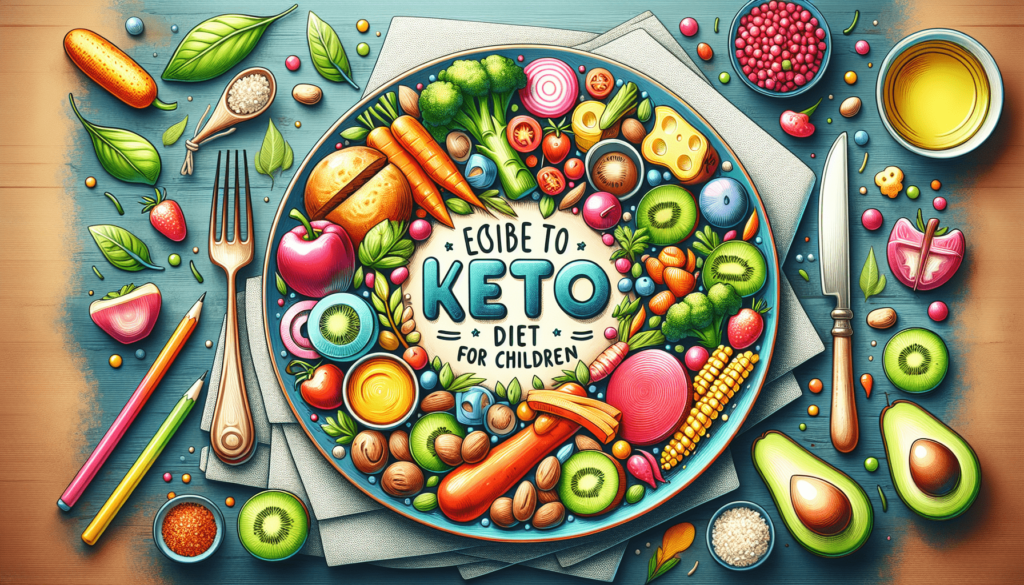If you’re a parent considering the keto diet for your child, you may be wondering whether it’s safe and appropriate. In this article, we’ll explore the topic of the keto diet for children and provide you with the information you need to make an informed decision. From tailoring the diet to meet their unique dietary requirements to managing potential health risks and conditions, we’ll delve into the various aspects of the keto diet for kids. So, if you’re curious about whether the keto diet is suitable for your child, keep reading to find out more.

Nutritional Needs of Children
Children have unique dietary needs that play a crucial role in their overall growth and development. It is important to provide them with a balanced diet that includes all the essential nutrients they need for optimal health. This article will explore the different dietary needs of children, the importance of balanced nutrition, and how the keto diet may affect nutrient intake in children.
Different Dietary Needs of Children
Children have distinct nutritional requirements compared to adults. As they grow and develop, their bodies require a variety of nutrients in specific amounts to support their physical and cognitive development. For example, children need an adequate intake of protein to support muscle and tissue growth, calcium for strong bones and teeth, and iron for proper cognitive function. Additionally, they need a sufficient intake of vitamins and minerals to support their immune system and overall health.
Importance of Balanced Nutrition for Growth and Development
Balanced nutrition is essential for children’s growth and development. A diet that includes a variety of nutrient-dense foods provides children with the energy and nutrients they need to thrive. A balanced diet consists of proteins, carbohydrates, fats, vitamins, minerals, and fiber in appropriate amounts. By ensuring a balanced nutrition, parents can help their children maintain a healthy weight, support their immune system, and promote optimal brain development.
How the Keto Diet May Affect Nutrient Intake
The keto diet, which is low in carbohydrates and high in fat, has gained popularity in recent years. However, it is important to consider how this diet may affect nutrient intake in children. The restrictive nature of the keto diet may lead to potential nutrient deficiencies if not carefully planned. Specifically, children on the keto diet may have a reduced intake of fruits, whole grains, and legumes, which are important sources of vitamins, minerals, and fiber. It’s essential to ensure that children following the keto diet are receiving all the necessary nutrients through other sources.

Potential Benefits of the Keto Diet for Children
While there are certain considerations to keep in mind, the keto diet may offer some potential benefits for children in specific circumstances. These benefits include weight management and obesity prevention, improved focus and cognitive function, and reduced seizures in children with epilepsy.
Weight Management and Obesity Prevention
Obesity is a growing concern among children, and the keto diet may help with weight management and obesity prevention. The high-fat content of the diet can help children feel full and satisfied, potentially reducing their overall calorie intake. By limiting carbohydrates, the keto diet may also help regulate blood sugar levels and prevent insulin spikes, which can contribute to weight gain.
Improved Focus and Cognitive Function
Some anecdotal evidence suggests that the keto diet can improve focus and cognitive function in children. By providing a stable source of energy in the form of ketones, the brain may function more efficiently in some individuals. However, additional research is needed to fully understand the impact of the keto diet on cognitive function in children.
Reduced Seizures in Children with Epilepsy
The keto diet has long been used as a therapeutic option for children with epilepsy who do not respond well to medication. The low carbohydrate and high-fat content of the diet may help reduce the frequency and severity of seizures in some children. It is important to note that the keto diet for epilepsy is typically closely supervised by healthcare professionals.
Health Considerations for Children on the Keto Diet
While the keto diet may offer potential benefits, there are also important health considerations to take into account, especially when it comes to children. These considerations include risks of nutrient deficiencies, impact on growth and development, and effect on bone health.
Risks of Nutrient Deficiencies
The restrictive nature of the keto diet can put children at risk of nutrient deficiencies if not carefully planned. As mentioned earlier, the diet limits the intake of fruits, whole grains, and legumes, which are important sources of vitamins, minerals, and fiber. It is crucial to ensure that children on the keto diet are receiving adequate amounts of all essential nutrients through other sources or supplementation if necessary.
Impact on Growth and Development
Children are growing rapidly, and proper nutrition is crucial for their growth and development. It is important to consider how the keto diet may impact their growth. Limited carbohydrates can potentially affect energy levels, muscle growth, and overall development. Again, close monitoring and consultation with healthcare professionals are essential to ensure that children on the keto diet are meeting their specific growth needs.
Effect on Bone Health
Adequate calcium intake is essential for children’s bone health, and the keto diet may present challenges in this regard. Since the diet restricts dairy, which is a common source of calcium, it is important to ensure that children on the keto diet are getting enough calcium from other sources, such as leafy greens and calcium-fortified foods. Calcium supplementation may also be necessary in some cases.

Implementing the Keto Diet for Children
If you are considering implementing the keto diet for your child, it is crucial to do so under the guidance of a healthcare professional. Consulting with a healthcare professional, such as a pediatrician or a registered dietitian, can help ensure that the diet is suitable and safe for your child. They can provide personalized advice, guide you in developing a customized meal plan, and address any concerns or questions you may have.
Consulting with a Healthcare Professional
Before starting your child on the keto diet, it is important to consult with a healthcare professional who is knowledgeable about pediatric nutrition. They can assess your child’s overall health and provide guidance on whether the diet is appropriate for them. They can also monitor their progress and make any necessary adjustments to ensure their nutritional needs are being met.
Developing a Customized Meal Plan
A healthcare professional can help you develop a customized meal plan that takes into account your child’s specific nutritional needs and preferences. The meal plan should include a variety of nutrient-dense foods to ensure they are getting all the essential nutrients. This may involve incorporating non-starchy vegetables, lean proteins, healthy fats, and limited amounts of low-carbohydrate fruits into their diet.
Ensuring Proper Hydration
Proper hydration is important for children on the keto diet, just as it is for anyone following a diet. Encourage your child to drink an adequate amount of water throughout the day to prevent dehydration. Limiting sugary beverages and opting for water, unsweetened tea, or flavored water can help meet their hydration needs without adding unnecessary carbohydrates to their diet.
Addressing Concerns about the Keto Diet
As with any dietary approach, there are valid concerns that need to be addressed when it comes to the keto diet for children. These concerns include the potential long-term effects on children’s health, the psychological impact on body image and self-esteem, and safely transitioning off the diet.
Long-Term Effects on Children’s Health
Since the keto diet is still a relatively new approach, there is limited research on its long-term effects on children’s health. It is important to consider the potential impacts on growth, metabolic health, and overall well-being. Monitoring your child’s health and seeking regular check-ups with their healthcare professional can help address any concerns that may arise.
Psychological Impact on Body Image and Self-Esteem
For children and adolescents, body image and self-esteem are important aspects of their overall well-being. The restrictive nature of the keto diet may lead to a heightened focus on food and body composition, which can potentially have a negative impact on body image and self-esteem. It is important to foster a positive relationship with food and emphasize the importance of overall health and well-being rather than solely focusing on weight or appearance.
Safely Transitioning off the Diet
If you decide to transition your child off the keto diet, it is important to do so safely and gradually. Sudden reintroduction of carbohydrates can cause digestive discomfort and potentially lead to weight gain. Working closely with a healthcare professional during this transition period can help ensure a smooth and safe process.

Monitoring and Managing Potential Side Effects
As with any diet, the keto diet may have potential side effects, especially during the initial adaptation period. It is important to be aware of these side effects and take appropriate measures to manage them. Common side effects can include the keto flu, digestive issues, and the possibility of nutrient deficiencies.
Understanding and Preventing the Keto Flu
The keto flu is a collection of symptoms that some individuals experience when transitioning to the keto diet. These symptoms may include fatigue, headaches, irritability, and dizziness. It is important to understand that these symptoms are usually temporary and can be managed by ensuring adequate hydration, electrolyte balance, and gradually adjusting to the diet.
Dealing with Digestive Issues
As the body adapts to a higher fat intake, some children may experience digestive issues such as constipation or diarrhea. It is important to address these issues by ensuring an adequate intake of fiber from non-starchy vegetables and healthy fats, such as avocados and nuts. Including probiotic-rich foods or considering a probiotic supplement may also help support gut health.
Recognizing Signs of Nutrient Deficiencies
Due to the nature of the keto diet, children may be at risk of certain nutrient deficiencies if not carefully monitored. It is important to regularly assess their nutritional status and watch for any signs of deficiency. Common nutrient deficiencies that can occur on the keto diet include calcium, vitamin D, magnesium, and certain B vitamins. Supplementation may be necessary to ensure they are meeting their nutritional needs.
Supporting Children’s Nutritional Needs
Regardless of the dietary approach, it is important to support children’s nutritional needs in a holistic manner. This involves including a variety of nutrient-dense foods, using appropriate supplements if necessary, and promoting a positive relationship with food.
Including a Variety of Nutrient-Dense Foods
To ensure that children receive all the essential nutrients they need, it is important to include a variety of nutrient-dense foods in their diet. This means incorporating a wide range of fruits, vegetables, lean proteins, and healthy fats into their meals and snacks. Encouraging them to try new foods and flavors can help expand their palate and ensure they are getting a diverse array of nutrients.
Using Appropriate Supplements if Necessary
In some cases, children on the keto diet may require supplementation to ensure they are meeting their nutritional needs. This should be done under the guidance of a healthcare professional who can assess their specific needs and recommend appropriate supplements. Common supplements that may be considered include omega-3 fatty acids, vitamin D, and calcium.
Promoting a Positive Relationship with Food
It is essential to promote a positive relationship with food and instill healthy eating habits in children. This includes fostering a balanced approach to nutrition, promoting intuitive eating, and teaching them to listen to their body’s hunger and fullness cues. Encouraging family meals and involving children in meal planning and preparation can also help create a positive food environment.

Communication with Healthcare Professionals
When it comes to the keto diet or any dietary approach for children, communication with healthcare professionals is key. They can provide valuable guidance, monitor your child’s health, and address any concerns or questions you may have. Involving pediatricians and registered dietitians in your child’s healthcare team can help ensure that their nutritional needs are being met and that their overall health is being supported.
Involving Pediatricians and Dietitians
Pediatricians and registered dietitians play a vital role in supporting children’s health and nutrition. They have specialized knowledge and expertise in pediatric nutrition and can provide evidence-based guidance tailored to your child’s individual needs. It is important to involve them in discussions about the keto diet and seek their advice and support throughout the process.
Regular Check-Ups and Monitoring
Regular check-ups with healthcare professionals are crucial when your child is following a special dietary approach. These check-ups allow for ongoing evaluation of your child’s growth, development, and overall health. Through regular monitoring, any potential issues can be identified and addressed promptly.
Seeking Guidance for Individual Cases
Every child is unique, and their nutritional needs may vary. It is essential to seek guidance from healthcare professionals for individual cases. They can provide personalized advice and recommendations based on your child’s specific health status, nutrient requirements, and dietary preferences.
Ensuring a Healthy and Balanced Keto Diet
To ensure that the keto diet is healthy and balanced for children, it is important to make mindful choices and prioritize the quality of foods consumed. This includes choosing high-quality, whole foods, maintaining adequate intake of essential nutrients, and balancing macronutrient ratios.
Choosing High-Quality, Whole Foods
When implementing the keto diet for children, it is important to choose high-quality, whole foods to provide them with the necessary nutrients. This includes selecting organic and minimally processed foods whenever possible. Opting for grass-fed meats, wild-caught fish, and organic fruits and vegetables can help minimize exposure to chemicals and maximize nutrient content.
Maintaining Adequate Intake of Essential Nutrients
One of the key considerations when following the keto diet is ensuring that children are receiving all the essential nutrients they need. This involves carefully planning their meals to include a variety of nutrient-dense foods that provide adequate amounts of vitamins, minerals, and other essential nutrients. Monitoring nutrient intake and potentially incorporating appropriate supplementation can also help fill any nutritional gaps.
Balancing Macronutrient Ratios
The keto diet is characterized by a high fat, moderate protein, and low carbohydrate intake. It is crucial to strike the right balance of macronutrients to meet children’s specific needs. This can be achieved by including healthy fats from sources such as avocados, nuts, and seeds, as well as lean sources of protein and limited amounts of carbohydrates from non-starchy vegetables and low-carbohydrate fruits.
Alternative Diets for Children
While the keto diet may be one option for children with specific needs or health conditions, it may not be suitable or necessary for every child. It is important to explore other dietary options and consider the unique needs of your child.
Exploring Other Dietary Options
There are various dietary options available that can support children’s health and meet their nutritional needs. These options include a balanced diet that incorporates a variety of whole foods, plant-based diets, or other specialized diets that may be recommended by healthcare professionals based on individual needs.
Considering Modified Ketogenic Diets
In some cases, a modified ketogenic diet or a less strict version of the keto diet may be more suitable for children. These modified versions may allow for slightly higher carbohydrate intake while still providing some of the potential benefits of ketosis. It is important to work closely with healthcare professionals to determine the most appropriate dietary approach for your child.
Seeking Professional Guidance for Alternatives
When considering alternative diets for children, it is important to seek professional guidance. Healthcare professionals, such as pediatricians or registered dietitians, can provide evidence-based recommendations tailored to your child’s specific needs. They can help you explore different dietary options and determine the most suitable approach for your child’s overall health and well-being.
In conclusion, the keto diet may offer potential benefits for children in specific circumstances, such as weight management, improved focus, and reduced seizures. However, it is crucial to keep in mind the potential risks and health considerations associated with the diet, especially for growing children. The implementation of the keto diet should be done under the guidance of healthcare professionals, who can provide personalized advice, develop a customized meal plan, and monitor your child’s progress. It is also important to address concerns, monitor and manage potential side effects, and support children’s holistic nutritional needs. By maintaining open communication with healthcare professionals and making mindful choices, it is possible to ensure a healthy and balanced dietary approach for children.

